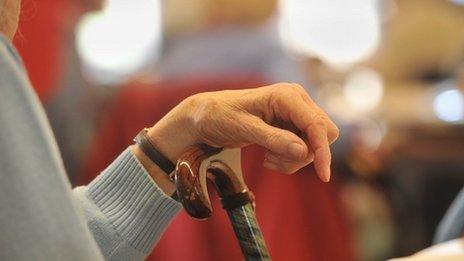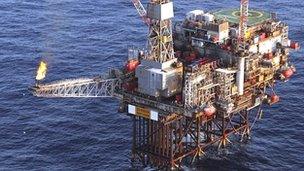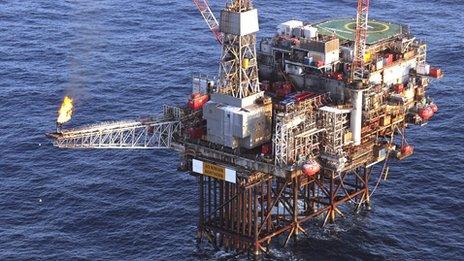Oil tax, immigration and getting older
- Published

More migrants may be needed to care for an ageing population
One dry and technical financial report has this week spawned a lot of headlines, and on completely different subjects north and south of the Cheviots.
The Office of Budget Responsibility (OBR) put the wind up middle England, with the prospect of a lot more immigration being required to balance the nation's finances over the next few decades.
"Britain needs 7 million MORE immigrants," headlined the Daily Mail.
"An influx of further immigrants," reported the Express.
But north of the border, the Scottish Sun was focussing on another bit of the OBR report: "Nats indy black hole". The Herald splashed with the "madness" of "basing separation case on oil".
The OBR had reassessed its reckoning of what offshore oil and gas will bring the Treasury over the next three decades or so.
It had assumed a lower price by 2040 than two years ago, and it had added the additional cost to the public finances of allowing extensive tax breaks for tens of billions of pounds of decommissioning of old offshore equipment.
The result was a steeper decline in tax revenues than previously predicted, with the share of national income from that source less than a third of the share the OBR had calculated only two years ago.
But then, the report also pointed out oil and gas revenue is the most volatile part of the UK's budget. It included a graph demonstrating the wildly inaccurate forecasts at which the Treasury has stabbed at the shape of its offshore bonanza down the years.
What are we to make of this? Oddly, there's an assumption in Scotland that the prospect of a very substantial increase in immigration is not seen as being that interesting to newspaper readers.
And also oddly, the supporters of Scotland's continuing place in the United Kingdom seem delighted to find the oil running out faster than previously thought. It makes a political point, for sure.
But if the UK continues to benefit from that tax revenue, it's surely rather a sobering thought if the Treasury in London is the government still gathering that tax.
Old and older
In any case, there's a very big part of the OBR report that falls between the immigration and the oil tax narratives.
It's the bit that explains the argument for more immigration. And it's exacerbated by the falling take from offshore oil and gas, allied to new, more cautious assumptions about productivity growth coming out of this downturn.
It's the demographic pressure building up on public finances. Health spending is on the way up from 7% of gross domestic product (GDP) in 2017 to 8.8% by 2062-63, rising smoothly as the population ages.

The OBR has continued to project a decline in oil and gas production at a rate of 5% per year
That's smaller than previously forecast. It seems a small increase in percentage terms, but bear in mind that the health service throughout the UK now costs well north of £100bn. The increase, very roughly, looks like £20bn.
That could be manageable while health remains a political priority. But then, you need to add in the cost of the state pension, rising from 5.8% of GDP to 8.4%.
And long-term care cost across the UK would rise from 1.3% of GDP to 2.4% in 2062-6.
The cumulative effect is large. Within 50 years, at today's prices, the OBR says a further 4% of national income will have to be found, or £61bn.
The big increase projected for immigration is not the consequence of liberal policy or open borders imposed from Brussels: with the shifting ratio of working age to non-working people, it's the calculation of how many more working age people Britain will need if it's to pay those rising bills.
There are interesting assumptions behind this, including the tax contribution from those over retirement wages who continue to work. In the 65 to 74 age bracket, that's already near 15%, and the OBR estimates it will rise to 25% over the next 50 years.
Note also that the big growth already in the number of over-65s in the workforce is largely in part-time work: 67% of them, compared with 25% of those of more conventional working age.
Perhaps no great surprise there. But less expected might be the level of self-employment among those aged 65 to 74: 31% compared with 13% for those under 65.
The not-old-yet
Let's not forget that an ageing population is a sign of a successful health service, safer workplaces and better lifestyle choices.
Let's also note that older people now are not the problem. The challenge comes from people, of my generation at the tail end of the baby boom, who are yet to get old, and those who come after us.
It poses big challenges to public finances. So for those who see the OBR report through the prism of the independence referendum and see oil revenue as its main finding, there's the challenge of what preparation is being made for this demographic change.
Spending watchdogs have said 'not enough'. MSPs, in committee, agree. The Institute for Fiscal Studies says the challenge will be as big as the current 'consolidation' of the public finances, even if there will be a longer period in which to address it.
So is independence the answer? Or is Westminster anywhere closer to addressing the same set of issues?
That's one of the issues on which voters will reach a judgement at the referendum next year.
They would do well to be wary of either side telling them demographic challenges can be solved easily.
- Published17 July 2013
